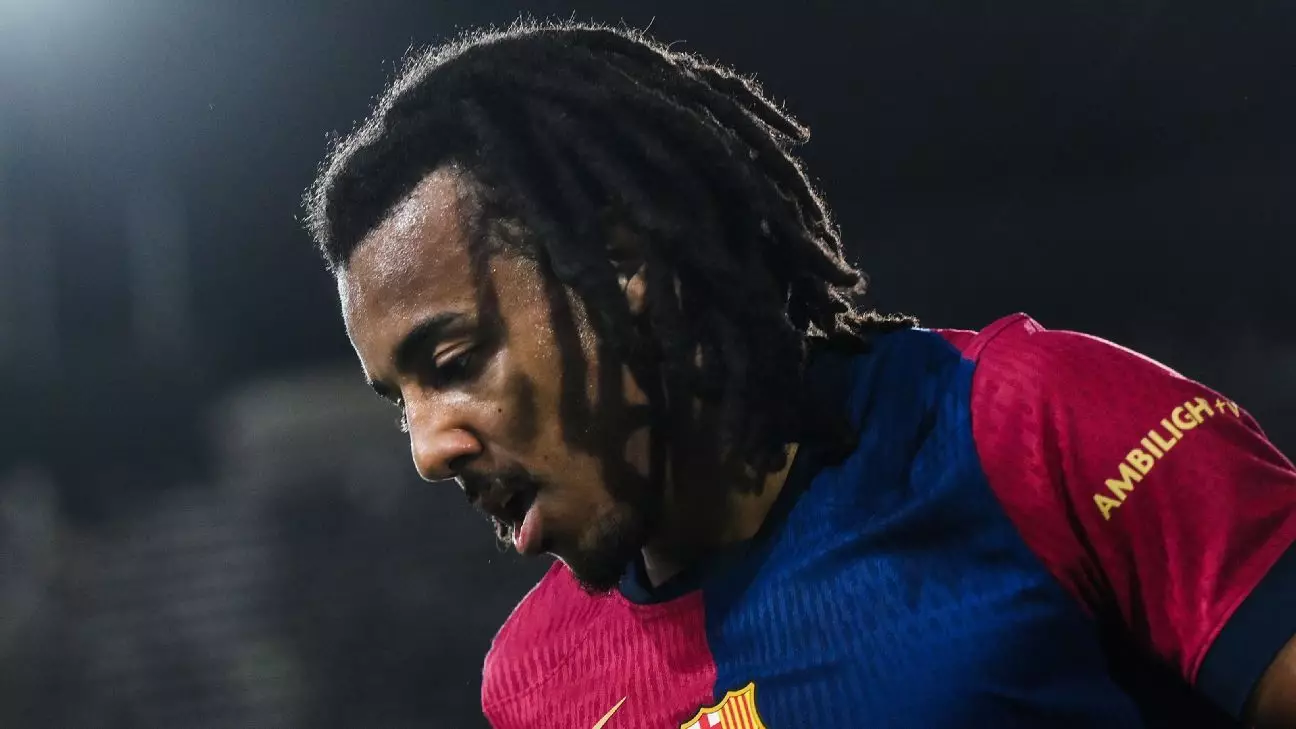In the high-stakes world of professional football, discipline extends well beyond the tactical formations laid out on a whiteboard. Barcelona’s recent 1-0 victory against Rayo Vallecano serves as a sobering reminder of how punctuality can significantly impact team dynamics and individual careers. Coach Hansi Flick’s decision to bench Jules Koundé for arriving late to a crucial pre-match meeting underscores the strict disciplinary measures that are essential for maintaining coherence within a squad. This wasn’t an isolated incident; Koundé’s tardiness has already cost him a starting position earlier this season against Alavés, marking a troubling trend for a player of his caliber.
Flick’s stance is emblematic of a broader philosophy in which respect for one’s role within the team hierarchy is paramount. A captain may steer a ship through turbulent waters, but it is the commitment of each crew member that ensures its safe passage. Koundé’s late arrival was not merely a lapse in judgment; it resonated as a failure to recognize the importance of collective responsibility and mutual respect for teammates, coaching staff, and the fervent fanbase that lives and breathes the club’s fortunes.
Flick’s managerial style emphasizes structured discipline as a foundational aspect of team success. His decision to bench goalkeeper Iñaki Peña for a similar offense earlier in the season encapsulates his commitment to enforcing punctuality. Such actions not only instill a sense of accountability among players but also cultivate an environment where professionalism is non-negotiable. By demonstrating that impropriety—no matter how trivial it may seem in isolation—will not be tolerated, Flick aims to reinforce high standards that are essential for a team aspiring to compete for top honors.
In a season characterized by ups and downs, Barcelona’s ability to rebound and assert their dominance at the summit of LaLiga could be attributed, in part, to this unwavering discipline. Coming off a spell where they struggled with form, the side has managed to go unbeaten in their last 12 matches. Flick’s insistence on punctuality and discipline is indicative not just of a desire for success, but a commitment to creating a resilient team ethos in a season defined by its volatility.
During the match against Rayo Vallecano, Barcelona’s performance was far from flawless. While Robert Lewandowski’s first-half penalty secured crucial points, the match’s final scoreline of 1-0 highlighted vulnerabilities within the Catalan side. Raphinha’s inability to convert several scoring opportunities adds another layer to the discussion about performance consistency. Such instances of wastefulness—where the margin for error is razor-thin—could potentially bite back in tighter encounters as the season progresses.
Conversely, Rayo displayed commendable resolve and aggression, almost capitalizing on errors made by the Barcelona defense. Appeals for penalties on both sides raised questions about refereeing consistency, a recurring theme that could be equally applied to performance inconsistency across both teams. Rayo’s coach Iñigo Pérez noted, with a sense of resignation, that “some days it goes for us; other days it doesn’t,” encapsulating the unpredictable nature of football. The disparity between potential and reality in both teams is one that should serve as a clarion call for greater diligence in execution.
As Barcelona finds themselves back at the top of LaLiga, flickers of concern still linger beneath the surface. The team must not lose sight of the long-term goal, as Flick aptly remarked about avoiding complacency in the league standings. “We always said we fight to the end,” he said, alluding to the mental fortitude required to navigate the rigors of a demanding season.
In the coming weeks, as the fixtures mount and pressures intensify, it will be crucial for Flick to ensure his squad remains not only technically sharp but also mentally resilient. Achieving harmony between punctuality and performance is vital, as distractions—whether self-imposed or external—can derail even the most promising campaigns. Barcelona’s journey will depend on their collective ability to learn from past mistakes, embrace discipline, and strive for that elusive consistency as they vie for their place in footballing history.

